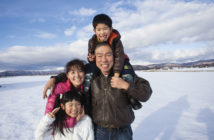On 15th December, 1981, Saori Maki was born in Rankoshi, a town of 6,500 people towards the western coast of Hokkaido.
The first seeds of her skiing career were planted at the young age of 3, in the rolling slopes of Niseko—merely a 30 minute drive from Rankoshi— which later blossomed when she won her first major victory at a large Hokkaido cross-country ski race for junior high school kids. Her skiing skills went from strength to strength, and she was soon signed to a sponsorship deal with the famous Austrian ski manufacturer, Atomic.
On the search for bigger and better things, Saori decided to move out to Sapporo to start high school; a move which her sponsor had suggested would help both her academic prospects and her training and competition opportunities.
Soon after graduating from Rankoshi Junior High in a class of 92 fellow students, Saori found herself attending her first day of high school alongside 400 other people: Hailing from a small-town school, far away from the bustling demands of the big city, she was stunned by the size and competitive academic atmosphere of urban schools.
“My high school grades weren’t the best, compared to junior high. Most of my friends in Sapporo knew how to study the smart way— especially in order to do their best on those big, important exams. Honestly, it came as such a shock to me!”
Fortunately, despite the unfamiliar scale of her new school, Saori was able to enjoy cross-country skiing to its fullest throughout her high school years. Qualifying for the national cross-country skiing team, she won first place in the national championships and was taken overseas to international races and training-camps for the first time.
Her teenage years coincided with the 1998 Winter Olympic Games in Nagano, which gave her unparalleled opportunities to meet some of the top ski jumpers and nordic athletes in the world, and she was able to learn many new techniques and develop her mental endurance.
As time went on, Saori’s talents were recognised and highly sought after, and she attended university on a scholarship, joining the intercollegiate cross-country skiing team where she practiced between 4 to 5 hours every day, 6 days a week. A tough but rewarding schedule, she spent most of the winter months away for training and tournament tours.
Although she was now used to intensive and busy academic and training schedules, she often strained under the strict rules and unfamiliar hierarchy of her formative years.
“Freshmen and sophomores were supposed to prepare breakfast at 4:00am, and then dinner after practice. Younger students had to follow all the rules— every night we couldn’t go to bed until all the older students did, and if you left a little dust on the table, the older students wouldn’t allow you to go outside that day!”
One of the older students, who was known as a world-class medallist, noticed her struggles and wavering motivation, and went out of her way to cheer her up with an uplifting piece of advice:
“You can quit anytime you want. Think about those who will never be able to come back after their injuries. Just go full out!”
Galvanised by her newfound appreciation for the opportunities she had been given, she aggressively trained and practiced with all she had as she pursued her passion once more, later becoming both a leader of her university skiing team, and a successful intercollegiate cross-country skier in her own right.
Succeeding in both her academic work and her skiing, she decided to retire after graduation instead of continuing her career as a professional cross-country skier. Like many other athletes, she had faced the reality of being a Japanese professional sportswoman: She had discovered that there was not enough financial support—even for top athletes—in many sports and disciplines, all over Japan.
Saori made up her mind to strengthen the support network for future athletes, so that the younger generation would not have to give up on their dreams as a result of financial uncertainty, academic hardship, or domestic difficulties.
In order to discover ways in which to do this, she decided that she would need to work closely with sports institutions, teams, and athletes, and act upon her findings. As a sports journalist, she travelled around the world for months to understand and learn the highly effective coaching methods used in high-ranked cross-country teams.
The distinct differences between Japan and the Northern European nations seemed to be greatly impacted by the competitiveness levels experienced during the early stages of life. Japan has many national championships for younger age-groups, which can put an intensive amount of pressure upon child-racers, as Saori herself had experienced.
Returning to her university for a coaching job alongside her journalistic career, Saori found that Japanese cross-country skiers retire relatively earlier than other nations. With less mental toughness training and development, they seemed to lose their enjoyment of snow sports far sooner, and as a result, would lose their intrinsic motivation for further competition.
“In Japan, you mostly concentrate on the speed, but most other countries teach how to enhance run efficiency by improving small movements, such as pole position. I found it interesting that mental training programs were given to athletes in many other countries.”
During the bubble period—a time of rapid economic growth in Japan—Saori finally moved to Niseko with her new family. At that time, the town was already crowded with people from overseas seeking the legendary powder.
After all of her travels abroad, she noticed that babysitting services were far less common in Japan, and found herself often hearing tales of many mothers staying at home and looking after their children while the fathers spent their time on the slopes. Seeing the chance to found another support service that could be of great benefit to many people, Saori established her babysitting service, WIN D’OL.
Saori strongly believed that mothers should not be stuck at home— they should be able to go out to enjoy the mountains and their amazing powder snow, and get the most out of their stay in Japan. With WIN D’OL, kids were able to try Japanese calligraphy or origami with their babysitters, and housekeeping services were even offered in order to give mothers and couples more time to ski.




